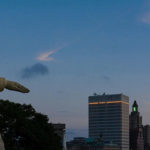If you love opinion polls—or if you just enjoy sampling the psyches of your fellow Americans—your time has come. Welcome to the 2016 presidential campaign.
Across the next 20 months, political candidates will hold their collective fingers aloft to test the electoral winds. So, we’ll be treated to a slew of surveys, a cornucopia of canvasses and a raft of research. Most of what we learn will be predictable. Some will be fascinating. And a bit will be downright scary.
 Editor Marv KnoxScary stuff already surfaced in a study administered by the Public Policy Polling research firm.
Editor Marv KnoxScary stuff already surfaced in a study administered by the Public Policy Polling research firm.
The survey asked Republican primary voters, “Would you support or oppose establishing Christianity as the national religion?” The results came down almost 2 to 1 in favor, with 57 percent of respondents indicating they support the idea, 30 percent saying they oppose it and 13 percent unsure.
Thank God for the First Amendment: “Congress shall make no law respecting an establishment of religion or prohibiting the free exercise thereof.”
Party affiliation of poll participants or pollsters is not the issue. Whatever their background, a sizable group of Americans wants to do away with the First Amendment in favor of a “national religion.” Religious liberty is skating on the thinnest ice in 224 years.
A secular, religiously neutral state
Despite what historical revisionists say, the United States’ founders did not seek to create a “Christian nation.” In fact, they explicitly fashioned a secular, religiously neutral state. Article VI, paragraph 3 of the U.S. Constitution states, “… no religious test shall ever be required as a qualification to any office or public trust under the United States.” Moreover, freedom of religion is the first guarantee in the First Amendment, prohibiting government from establishing religion and ensuring free exercise of all faiths.
To be sure, religious pilgrims settled the New World. Many of them fled persecution and journeyed to America for religious freedom—their religious freedom. Consequently, some of them established theocratic colonies, which affirmed the majority faith and disenfranchised, if not outright persecuted, followers of other faiths. Baptist Roger Williams secured the brightest colonial beachhead for religious liberty. He chartered Rhode Island as a safe haven for people of all faiths and no faith.
Sign up for our weekly edition and get all our headlines in your inbox on Thursdays
Guarantee of religious liberty for all
By the time the founders established the United States, they mirrored Williams and Rhode Island, resolving to create a secular republic that guarantees religious liberty for all people. Many, probably most, held tightly to personal faith. But they learned from state-sponsored, monarchy-administered religious wars and religious persecution in Europe. They also recognized the toxic trend toward religious repression in the colonies and realized it must be eradicated for the new nation to flourish.
Although the Constitution does not mention God, the United States enjoyed divine blessing. People of all religious beliefs from all over the world arrived on these shores, and faith flourished.
Faith is almost impossible to quantify. But one set of statistics illustrates the sharp difference between faith-vitality in the United States and flaccid faith in countries where a “national religion” is established. About 40 percent of U.S. citizens regularly attend church, in contrast to piddling attendance in European countries where churches receive state support, including, among others, the United Kingdom (12 percent), Greece (27 percent), Denmark (3 percent), Finland (5 percent), France (12 percent) and Italy (31 percent). In Germany, where the government collects taxes for both groups, less than 4 percent of Protestants and 13 percent of Catholics attend church, even on holy days.
Why would Christians want to defy faith legacy, national history and geo-theological trends to establish a “national religion”?
Threatened by religious plurality
Obviously, many Christians feel threatened by the United States’ increasing religious plurality. The Public Religion Research Institute has released its American Values Atlas, which details the nation’s faith communities. The atlas reveals the United States no longer is majority-Protestant. Only 45 percent of Americans are Protestant, and only 32 percent are white Protestant.
Catholics account for 23 percent of the U.S. population, followed closely by the unaffiliated (22 percent). Then come Mormons and Jews (2 percent each), Jehovah’s Witnesses, Orthodox Christians, Muslims, Buddhists, Hindus and others (1 percent each).
On top of this, the government’s often-clumsy approach to religion—from local school boards to the Justice Department—leaves many Christians worried. Sometimes, it sounds as if they’re worried about the erosion of religious liberty. Other times, it sounds more like they’re worried about losing their privileged status.
Still, establishing a “national religion”—even your own—is a bad idea. No matter your religion. No matter your party.
As Religion News Service columnist Tom Ehrich asked, “If the U.S. is a Christian nation, whose Christianity do we follow?” He points to more than 1,500 Christian denominations in the nation. They range from liberal to conservative; from Roman Catholic to Orthodox to Protestant to nondenominational; from small, old-fashioned community congregations to hip mega contemporary churches.
A Faustian bargain
Bringing the question closer to home, think about Texas.
The American Values Atlas shows white evangelical Protestants—mostly conservative, but all varieties—are practically in a tie, at 19 percent of the population, with Hispanic Catholics (18 percent) and the unaffiliated (18 percent). And guess what? Hispanic Catholics and the unchurched are increasing, while the white evangelical Protestants are declining.
If Baptists were to defy our denominational legacy and usurp the Constitution to back a state church, it would be a Faustian bargain—a deal with the devil—we’d surely regret.














We seek to connect God’s story and God’s people around the world. To learn more about God’s story, click here.
Send comments and feedback to Eric Black, our editor. For comments to be published, please specify “letter to the editor.” Maximum length for publication is 300 words.